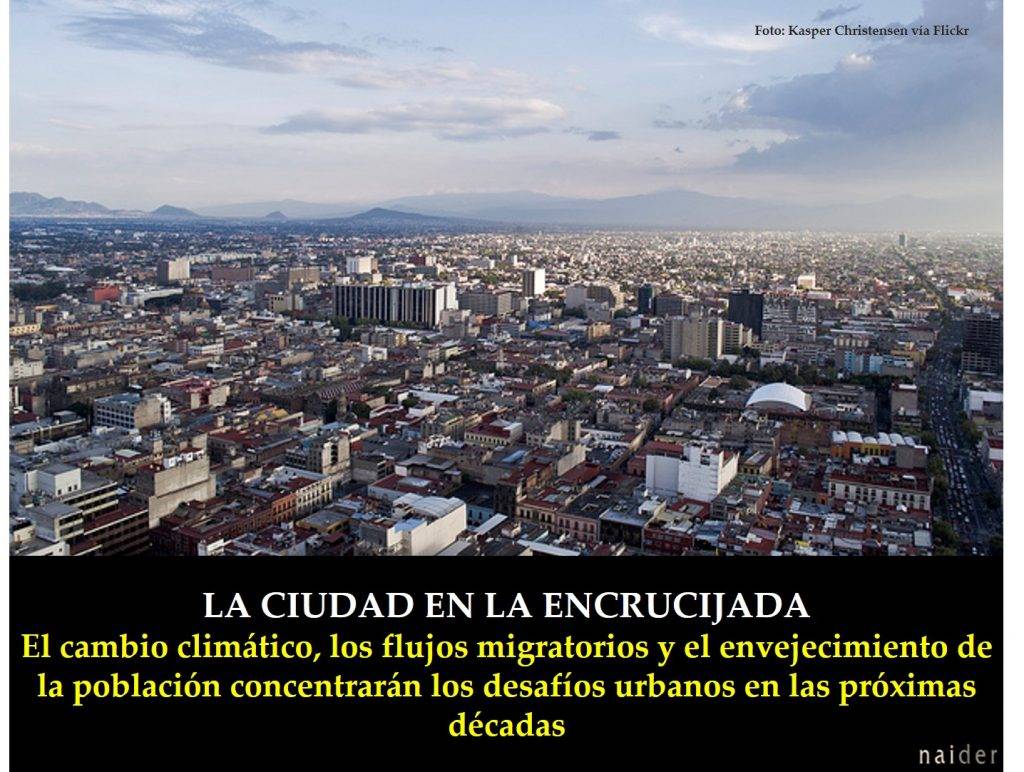 Cities have concentrated the majority of the population since 2008, the year in which for the first time the population living in rural areas was less than that settled in cities . One of the most outstanding challenges is that by the year 2050 the urban population will have doubled (World Urbanization Prospect, United Nations, 2014), “what will make urbanization one of the most transformative trends in the 21st century” (New Urban Agenda).
Cities have concentrated the majority of the population since 2008, the year in which for the first time the population living in rural areas was less than that settled in cities . One of the most outstanding challenges is that by the year 2050 the urban population will have doubled (World Urbanization Prospect, United Nations, 2014), “what will make urbanization one of the most transformative trends in the 21st century” (New Urban Agenda).
This global demographic growth accelerates Climate Change, triggering the demand for resources, degrading and devastating natural spaces, fragmenting habitats, causing a decrease in biodiversity and contaminating natural areas. Cities are the cause of much of this unsustainable growth as they consume 75% of the energy and emit between 50-60% of greenhouse gas emissions (UN Habitat).
The globalization of markets together with an increasing cross-border human mobility is making migratory flows another problem for which cities do not have the tools or infrastructure capable of facing this challenge. As stated by the International Organization for Migration (IOM), This trend will increase since “environmental factors have always caused migration and Climate Change will amplify episodes of environmental change.” Nicholas Stern, in his 2006 report, also predicted that the economic consequences of global warming would mean “greater scarcity of resources, desertification, the risks of droughts and floods, and the rise in sea level could cause millions of people to migrate” (Stern , The Economics of Climate Change, 2006).

Photo: Cusco, by McKay Savage, via Flickr
Many of our new fellow citizens settle in marginal residential areas that are usually “poor living spaces” (J. Subirats et. al., 2017). In addition, in most cases immigrants are not integrated into society, creating a fragmented community that misses out on the richness of multiculturalism.
Another of the global trends that cities must face, especially in developed countries*, is the aging of the population and the decrease in the population of working age. Thus, in the case of Spain, in 2066 there will be more than 14 million elderly people, 34.6% of the total population, and the elderly will triple the number of children (National Institute of Statistics, Population projections 2016–2066).
Cities must pay special attention to the care economy and introduce into the production model and economic relations a whole set of activities (some paid, many others unpaid or very precarious) that allow our society to continue to function and the economic system to continue to operate.

Computer technologies, the internet of things, smart cities, BIG Data, Open Data and other concepts have taken over our language and it is becoming increasingly clear that the future of cities involves integrating these new digital possibilities in the management of cities. (Photo: Chip, Dominik Bartsch)
The incipient monitoring and citizen control through new technologies also entails a problem in terms of human rights (Universal Declaration of Human Rights) that still remain unresolved today. In the event that the policy is directed “by liberalized flows of capital, technology and information, it can cause movements that influence prioritizing efficiency in the provision of services more than equity in their distribution, which can generate social spaces in cities increasingly fragmented and specialized” (Subirats et. al., 2017).
The consequences of these realities in cities go beyond municipal borders and collaboration between localities, regions and territories becomes a necessity of the first order to face these challenges. That is why the need for a culture of common interest that has a long-term perspective based on political and citizen commitments, with a shared vision becomes palpable. of regional development in the new world context where we immerse ourselves and where cities play a fundamental role.
 The correct development of cities that face these described challenges requires the integration of egalitarian, participatory and collaborative governance, which guarantees quality services guided by efficiency and social responsibility and environmental awareness, from the perspective of “making a metropolitan city”. (Photo: Market, Manfred Morgner)
The correct development of cities that face these described challenges requires the integration of egalitarian, participatory and collaborative governance, which guarantees quality services guided by efficiency and social responsibility and environmental awareness, from the perspective of “making a metropolitan city”. (Photo: Market, Manfred Morgner)
**According to the UN: a developed country is one that has the status of advanced economy based on the IMF statutes and also has high incomes according to the World Bank.